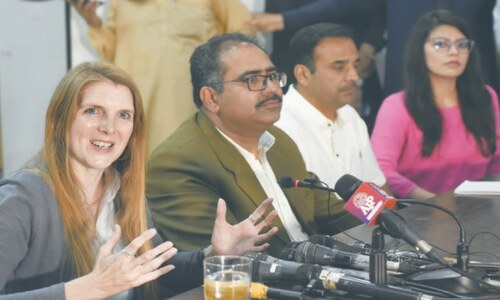ISLAMABAD: After being capped for nearly 15 years, the prices of over 50,000 medicines will be increased next month. Both the national health services (NHS) ministry and the pharmaceutical industry have been looking at the consumer price index (CPI) which will be considered for the increase in prices.
Pharma Bureau Executive Director Ayesha Tammy Haq appreciated that the process for a uniform increase in prices has begun, but expressed concerns that the CPI may not reflect accurate statistics. She also demanded that the prices are increased automatically – a formula for this has been devised – instead of with the government’s permission.
NHS Secretary Ayub Sheikh said it was necessary to keep a check on the industry regarding an increase in prices. He added that the industry need not worry, as the prices would be increased according to policy.
Prices of scheduled, non-scheduled drugs to be increased by 50pc, 75pc of CPI
Prior to 2001, medicine prices would increase according to a uniform formula. In 2001, prices were frozen, after which the majority of local manufacturers did not see an increase in prices except in cases of hardship, when companies felt it was not viable for them to manufacture medicines at the fixed prices.
Some multinational companies from time to time went to court and obtained stay orders after increasing the prices of their medicines. In November 2013, the Drug Regulatory Authority of Pakistan (Drap) increased medicine prices by 15pc, and then withdrew the notification the next day on the orders of the prime minister. Some companies obtained stay orders against the move, and continued selling medicines at higher rates.
An NHS ministry official said according to the new policy, prices of scheduled drugs (over 300 molecules also known as life-saving drugs) and non-scheduled drugs will be increased by 50pc and 70pc of the CPI, respectively. The prices of threshold drugs – drugs that are priced less than Re1 per tablet – will be increased by 100pc of the CPI.
The CPI is released by the Bureau of Statistics on a monthly and annual basis. It measures changes in the price level of consumer goods and services purchased by households. In other words, the CPI is the annual increase in prices, and according to estimates, the CPI will remain between 3pc to 3.5pc this year.
“If the CPI remains at 3pc, the prices of scheduled drugs will be increased by 1.5pc, non-scheduled drugs by 2.1pc and threshold drugs by 3pc,” the official said.
Drap pricing director, Amanullah, said this was the first time that the CPI will remain low. But he added that this would not make a difference to the pharmaceutical industry, because prices will be increased according to the price hike.
“Although it is believed that there are over 50,000 medicines in the market, a number of them have been withdrawn and others don’t produce them. So ideally, there are over 10,000 medicines in the market,” he said.
“Around 55pc of medicines [5,500] are scheduled drugs, and others are non-scheduled and threshold drugs. As soon as the CPI is announced, we will notify it and the prices of medicines will be increased.”
Ms Haq told Dawn that while the increase in prices under a uniform formula is a positive step, the industry should be compensated for the price cap since 2001.
“It is being questioned by economists whether the CPI is really 3pc or not. In addition, the policy came in 2015, so the formula should have been implemented last year. Another issue is that, in the policy it is mentioned that Drap will increase the prices, but the federal government will give final approval,” she said.
“Say, if Drap approves and the federal government disapproves the increase once again. We will face problems. The industry should be allowed to increase prices automatically, according to the formula, and in case of any objections, Drap can take the appropriate action.”
“As per our calculations, the prices of most of the medicines will be increased by less than a rupee. We are still selling each tablet for less than a rupee, but the price of candy has reached Rs5,” she said.
According to Mr Sheikh, the NHS secretary, the CPI will be announced in the first week of July, after which the ministry will notify the increase in prices within four days.
“According to policy, pharmaceutical companies have to send us a hard copy [of] their existing prices, and what those will be after the price is increased. They also have to upload the document to the Drap website. After that, companies have to wait 15 days, and then they can automatically increase prices,” he said.
“We will verify the prices within 15 days, and in case of any confusion the company will be contacted. The arrangement has been made to avoid any fraud or confusion.”
Published in Dawn, June 19th, 2016














































Dear visitor, the comments section is undergoing an overhaul and will return soon.